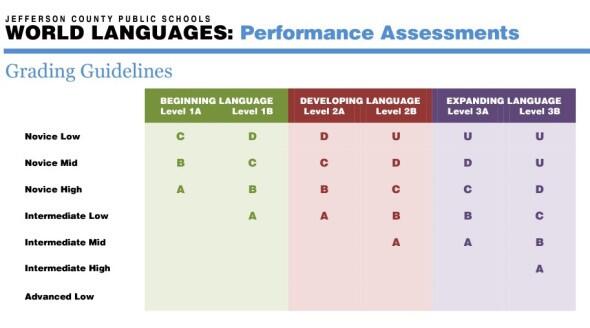I’ve gotten this question several times lately and it’s made me remember I sort of blogged on that when I wrote about taking the leap to standards-based assessment but I should go into it a little more.
So, you’re ready to move to proficiency-based assessment and standards-based grading, but if you’re assessment is focused on telling students where their proficiency is hitting and what they can do to improve, what do you do when you’re required to give a number grade?
I inherited a passionate hatred for grades from my dad, a brilliant, creative homeschooler and certainly the most influential person in my life. A number on a piece of paper doesn’t tell me anything. Or rather, maybe it tells me everything, but I can’t interpret it. Perhaps it’s trying to tell me how much sleep the student got last night, or whether his eyes wandered to the girl’s paper one desk over, or to the girl herself, or that he bombed his calculus quiz last period and hates the world right now. Maybe it says he turned the assignment in three days late. Maybe it says he didn’t understand the directions. I don’t know. For sure what it doesn’t tell me is what I really need to know: what can he do with language?
Following some work I did with the excellent teachers involved in developing curriculum for the Jefferson County (KY) Public Schools (quickly becoming the gold standard in district curriculum development – I am blessed to collaborate with these teachers!), I developed my own proficiency-based performance assessment rubric. But I get a question at times about how I put an actual grade on it – there isn’t a place on the rubric for a grade. That’s by design. If a grade doesn’t tell me anything, it tells my students even less, so why would I write it on their assignment? I choose instead to give them much more helpful feedback, like what structures and word choices they’re using well and how they can push themselves to the next level. They know exactly where our expectations are and how they can meet or exceed them. It’s empowering.
However, I do have to put a grade in a gradebook for my school. We’re required to give a certain number of grades, in categories of “daily” and “test,” per quarter. So what do I do? Well, I sort of copy the JCPS model there too. Here’s a snapshot of how they assign grades:
So you can see, meeting expectations is a B. Students have to exceed expectations to receive an A.
But I have to put an actual number. How do I come up with the number? If a student is meeting the expectation in all major areas (vocabulary use, structure, comprehensibility, and comprehension) the grade is right in the middle of B. For us, with 80-89 being a B, that means an 85. I move the number one way or the other if students tend lower or higher in one or two categories. So if they’re meeting expectations in two categories and exceeding them in two categories, the number is closer to A. If they’re meeting expectations in one category and exceeding in three, they can receive a low A. Does that make sense?
The number will also move one way or the other depending on how students do in the minor categories, language control and task completion. These areas might become more important depending on the subject. In AP, task completion is actually much more important than in the lower levels because it’s scored so critically on the exam. So if my students in AP ignore some task requirements their grade will move more than if they were in level 1.
So, in my class, exceeding expecations overall earns an A, meeting expectations earns a B, approaching expectations earns a C, and you’ll see that my last catogory in the “score” box is “Unsatisfactory: I need considerable improvement before I try again.” What happens there? Well, in my class, this score earns a failing grade, and failing a performance assessment is not an option for my students, so it means they have to redo the assessment. Every time. I do not allow a grade of “Unsatisfactory” to stand. Also, I allow students to redo any assignment that receives “Approaching expectations.” Especially in the advanced electives, I get students who are very focused on receiving As in their courses and they languish over a C. So they can redo any assessment scored lower than “Meeting expectations.” I do not allow students to redo a “Meeting expectations” assessment to try for “Exceeding expectations”- I simply am not willing to try to work that into my schedule.
How do students find out what their grade was? They actually have to log into our online gradebook (RenWeb) to find out. Some students who don’t bother with it never find out what their number grade was on a particular assignment. Is that a bad thing? Not in my opinion. If I didn’t have to give it I wouldn’t – why would I care if they know about it?
One last thing: what are the expectations? You can see above what JCPS’s expectations are. Mine are very similar. Keep in mind I teach in a school with small, sometimes very small, class sizes. Our stated expectations are:
- Level 1: NM first semester, NH second semester
- Level 2: NH first semester, IL second semester
- Level 3: IL first semester, IM second semester
- Level 4 (AP): IM first semester, IH second semester
Here’s another aspect of the beauty of this system: it’s flexible. If my expectations don’t work for you, you know what works for you. Even more than that, when they don’t work for me and my students, I adjust them too! I actually have had students achieve consistent Advanced Low proficiency in their fourth year. The factors involved there seem to have been a combination of a very strong foundation in level 1 (Level 1 teachers please stay the course!) and a high aptitude. One of these students missed a quarter of her senior year due to illness and then scored a 4 on the AP exam. But you know and I know that not all students are like that (and that is okay). Then came this year. The students I have now in AP (4th year) had a very piecemeal Spanish 1 and 2 class. Then for at least half their Spanish 3 class I tried to force my intermediate curriculum to work for novice students instead of adjusting for them. Right now in some categories they still perform at novice high. If I maintained our stated expectations, they’d be getting low grades on everything and get very discouraged. So, I adjust. This semester in AP, “meeting expectations” is not intermediate high, it’s intermediate mid. You know your situation and your students and you can adjust accordingly.
If you want to create a classroom culture that knows what proficiency is and works to improve it, you’ve got to incorporate that philosophy into your assessment. I hope these scale ideas offer you a practical solution for doing so.
11 Comments
Comments are closed.





[…] […]
THANK YOU! This is what I have been doing, but seeing it here is very affirming and relieving!
Hi Sarah,
With growing envy and amazement, I looked at the Jefferson Cty PS (KY) curriculum site, and my questions are – What supports did they have to be able to develop this incredible site? How long did it take them to create this? How many people worked on it? When? (I’m thinking it must have happened during paid summer PD.) Any other insights you have would be appreciated.
Hi Simone – I was privileged to be involved in some of the work the JCPS cohorts did on their curriculum, just as a tag-along as I was exploring my own personal growth as a teacher and curriculum developer. I can’t say exactly how long they worked on this, but it seems like it took at least 3 years to put together the 3 levels, and level 3 still needs work. If I remember correctly there were perhaps 10-15 core teachers involved on the majority of the development along with the curriculum specialist and at least two private consultants. A lot of it was done in week-long summer PD.
Simone, I got some more details for you “from the horse’s mouth” so-to-speak: JCPS teachers developed the units and assessments over a period of almost four years. Teachers met about every other month during the school year for two days and then a week during the summer. Teachers were not paid (other than lunches and snacks). Support was provided by Greg Duncan (Interprep Inc) and the district specialist (at the time, Thomas Sauer).
I have a question about the ACTFL-based expectations. I’m all on board with grades reflecting what students can actually *do* with the language, but I wonder about the speed of the expected progression. The levels take longer and longer to transition out of the higher you go. Novice is the easiest level to get out of, so moving up a sublevel a semester doesn’t seem too bad. But expecting to jump through the intermediate levels over the course of the next few semesters seems unrealistic to me. And that’s just to “meet” expectations?
It totally depends on your program. You’re right that it typically takes a lot longer to move through the intermediate level. But you have to remember that after level 2, for the past 4 years my largest class has been 8 students. When you have classes that small, students get a whole lot more input and practice than in larger classes. (I should have mentioned this in the post!) Also, we don’t expect students to pass Intermediate. I don’t ever have Advanced Low as an actual expectation – our final expectation is Intermediate High. It does bug my students that they can’t get an “A” on a performance assessment without really excelling (but isn’t that what an A is for) but the students who are bugged by it almost always end up with an A in the class thanks to the daily grades they earn, which are worth 50% of their grade at my school. Thanks for the great question.
Thanks, Sara. I have been working with performance-based assessments and moving moving students to an understanding of proficiency levels, but like you, I am required to provide number grades. This gives me some ideas that will make sense to my principal (who has been supportive of my efforts).
You are welcome!
[…] how I’ve always assigned grades to a proficiency rubric (there’s no change here), see this post. So, I’m trying to put ownership of the learning in the student’s hands, and my […]
[…] you let me give a performance assessment as my final exam if I show you how I can translate my feedback into a number/letter […]